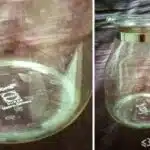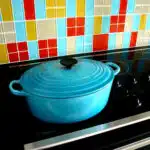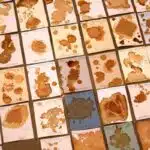As a stone countertop cleaning specialist, I have seen many homeowners struggle with maintaining the beauty and durability of their stone countertops. Stone countertops are a popular choice for modern kitchens due to their natural elegance and ability to withstand daily wear and tear, but they require proper care and maintenance to ensure longevity. In this article, I will share my expertise on how to clean stone countertops effectively while avoiding damage.
Stone countertops come in a variety of materials such as granite, marble, quartz, and soapstone. Each material has unique properties that require specific cleaning methods. Using the wrong products or techniques can cause permanent damage to the stone surface. It is essential to understand the type of stone you have before starting any cleaning process. By following these instructions, you can keep your stone countertops looking beautiful for years to come without compromising their quality or integrity.
Understanding Your Stone Countertops
As a stone countertop cleaning specialist, it is crucial to understand the different types of countertop materials and how to properly clean them. Each material has unique characteristics that require specific care to preserve their beauty and longevity. Therefore, before selecting any cleaning products, it’s necessary to identify what kind of stone you’re dealing with.
Understanding countertop materials is essential because various stones react differently to certain substances. For instance, acidic cleaners can damage marble countertops significantly. On the other hand, granite countertops are more durable and resistant to acidic cleaners but require gentle handling. So, in short, knowing your stone material helps you select the right cleaning products and techniques.
To select the right cleaning product for your stone countertops, you need to know its composition and finish. Some stones are porous and more prone to stains than others; hence they require sealing regularly. Other stones have much denser compositions that make them less absorbent but more challenging to clean stains from their surface. Identifying your stone material helps in determining how often you need professional cleaning services or specialized products for maintenance.
Identifying Your Stone Material
Before you start cleaning your stone countertops, it is crucial to identify the type of material used for your countertop. Each stone material has a specific cleaning requirement and using the wrong cleaner can lead to damage and discoloration. Common types of stone materials used for countertops include granite, marble, quartz, and soapstone.
Identifying tools are essential when identifying your stone material. You may use a magnifying glass or flashlight to examine the surface closely. Granite has a speckled appearance with visible grains while marble has veining patterns and a smoother surface. Quartz has a more consistent pattern, while soapstone appears smooth with some marbling effect.
Differentiating materials is also vital in identifying your stone material correctly. When scratching the surface with a sharp object like a knife or razor blade, granite is hard to scratch while marble will show an etched mark. Quartz is almost impossible to scratch due to its high resistance to scratches. On the other hand, soapstone is softer than most stones and will scratch easily.
Now that you have identified your stone material accurately, you can proceed to gather your cleaning supplies needed for proper maintenance. With the right tools in hand, you can now clean your countertops with confidence knowing that they are well-protected from any damage that may occur during the cleaning process.
Gathering Your Cleaning Supplies
After identifying the type of stone material your countertop is made of, it’s time to gather your cleaning supplies. Proper cleaning products and tools are essential in maintaining the beauty and longevity of your stone surface. In addition, choosing safe cleaning options will ensure that you don’t damage or discolor your countertop.
Firstly, essential supplies for cleaning stone countertops include a pH-neutral cleaner, microfiber cloths or soft sponges, and warm water. Avoid using abrasive cleaners or scouring pads as they can scratch and dull the surface. Instead, opt for a gentle cleaner specially formulated for natural stones. Microfiber cloths or soft sponges are perfect for wiping down the surface without leaving streaks or scratches.
Secondly, there are safe cleaning options that you can try at home before resorting to commercial products. For example, you can use a mixture of warm water and mild dish soap to clean your countertop. Simply mix a few drops of dish soap with warm water in a spray bottle, then spray and wipe down the surface with a microfiber cloth or soft sponge. Another option is using baking soda mixed with water to create a paste that you can apply on stubborn stains.
Now that you have gathered all the necessary supplies and know about safe cleaning options for your stone countertop, it’s time to move on to preparing your countertop for cleaning.
Preparing Your Countertop
Pre cleaning steps are crucial to guarantee a thorough and effective cleaning of your stone countertops. Before beginning the cleaning process, make sure to remove any loose debris or dirt from the surface using a dry cloth or brush. This will prevent any scratches or damage to the stone surface during the cleaning process.
It is essential to use proper cleaning techniques when dealing with stone countertops. Harsh chemicals, acidic substances, and abrasive cleaners can damage the stone’s surface, leading to scratches, chips, and dullness over time. Instead, opt for natural and mild cleansers specifically designed for stone surfaces.
To ensure that your countertop stays in pristine condition for years to come, it is recommended that you seal it every six months. Sealing your countertop provides an extra layer of protection against stains and spills while also enhancing its shine and color. Follow the manufacturer’s instructions on how to apply the sealer properly.
- Use a non-abrasive sponge or cloth when wiping down your countertop.
- Avoid placing hot objects directly on the surface as this can lead to discoloration.
- Always clean up spills immediately with a damp cloth to prevent staining.
- Do not use vinegar or lemon juice-based cleaners on marble surfaces as they can cause etching.
- Use coasters under glasses and bottles to prevent water rings from forming.
Next up: removing stains and spills without damaging your countertop surface!
Removing Stains And Spills
- Removing oil, grease, and cooking spills from stone countertops requires a slightly different approach compared to other surfaces as the porous material requires specialized cleaning products.
- Oil, grease, and cooking spills should be wiped up immediately with a paper towel and a cleaner specifically designed for stone countertops should be used to break down the residue.
- Coffee, tea, and juice spills should also be wiped up quickly with a paper towel and a mild detergent and warm water should be used for tough stains.
- It is important to rinse the countertop with clean water and dry it with a soft cloth to avoid any damage to the surface and to prevent staining.
Removing Oil
Are you tired of seeing oil stains on your stone countertops? As a specialist in stone countertop cleaning, I understand the frustration that comes with trying to remove these stubborn stains. Using baking soda, vinegar, and other natural remedies can effectively remove oil from stone countertops without causing any damage.
To start, sprinkle a generous amount of baking soda onto the affected area and let it sit for 15-20 minutes. Then, using a damp cloth, gently scrub the area until the oil stain is lifted. If the stain persists, create a paste by mixing equal parts baking soda and water and apply it to the stain. Let it sit for 30 minutes before wiping it away with a damp cloth.
Preventing oil stains on stone countertops is just as important as removing them. Always wipe up spills immediately to prevent them from penetrating into the porous surface of the stone. Additionally, avoid placing hot pots and pans directly onto the countertop as this can cause discoloration and damage.
In conclusion, removing oil stains from stone countertops doesn’t have to be a daunting task. By using natural remedies like baking soda and vinegar and taking preventive measures to avoid oil spills in the first place, you can keep your stone countertops looking clean and beautiful for years to come.
Grease
As a stone countertop cleaning specialist, one of the most common types of stains I encounter is grease. Removing grease stains can be challenging, especially if they have been left untreated for a long time. Grease buildup on stone countertops not only looks unsightly but can also attract bacteria and other harmful microorganisms.
To remove grease stains from stone countertops, start by wiping up any excess grease with a paper towel or cloth. Then, mix equal parts water and dish soap in a spray bottle and apply it to the affected area. Let it sit for 10-15 minutes before wiping it away with a damp cloth. For stubborn stains, use a paste made from baking soda and water and apply it to the stain. Let it sit for 30 minutes before wiping it away with a damp cloth.
Preventing grease buildup on stone countertops is essential to maintaining their appearance and longevity. Avoid using harsh chemicals or abrasive cleaners that can damage the surface of the stone. Instead, use mild soap and warm water to clean your countertops regularly. Also, consider using a sealer that will help protect your countertops from oil and grease stains.
In conclusion, removing grease stains from stone countertops requires patience and persistence. By following these simple steps and taking preventive measures to avoid grease buildup in the first place, you can keep your stone countertops looking pristine for years to come. Remember that proper maintenance is key to preserving the beauty and functionality of your stone surfaces.
Handling Tough Stains
Imagine you have a beautiful stone countertop that has been stained by spilled wine. You’ve tried wiping it down with soap and water, but the stain remains. Don’t worry; there are ways to remove tough stains from your stone countertop.
Using natural remedies is one way to handle tough stains. For example, you can make a paste of baking soda and water and apply it to the stain for 15 minutes before rinsing it off with warm water. Another natural remedy is using hydrogen peroxide mixed with flour to create a paste that should be left on the stain for several hours before being rinsed off. These remedies may require multiple applications, depending on how deep the stain is.
If natural remedies don’t work, consider professional cleaning services. They have access to specialized equipment and solutions that can remove even the toughest stains without damaging your precious countertop. It’s important to note that these services can be costly, so try natural remedies first before resorting to professional help.
When all else fails, it’s time to call in a professional cleaner or use commercial-grade cleaning products that are safe for stone countertops. In any case, always read the label carefully and follow instructions precisely to avoid causing any damage or discoloration on your countertop surface. After getting rid of those stubborn stains, you’ll want your countertop polished up next!
Polishing Your Countertop
Now that you have successfully cleaned your stone countertop, it is important to keep its shine. Polishing is an excellent way to do this. There are two options when it comes to polishing: DIY or professional polishing. DIY polishing can be done using a variety of products, while professional polishing requires the expertise of a specialist.
DIY polishing can save you money and allow you to take control of the process. However, it may not produce the same results as professional polishing. The best products for DIY polishing include special polishers designed for stone countertops, microfiber cloths, and non-abrasive cleaners. When using these products, be sure to follow all instructions carefully.
If you decide to go with professional polishing, make sure you choose a reputable company with experience in working with stone countertops. They will use specialized equipment and products to achieve a perfect finish that lasts longer than DIY methods. Additionally, professionals have access to high-quality sealants that protect your countertop from future damage.
Incorporate these tips into your cleaning routine and your countertop will remain shiny for years to come. In the next section, we will discuss how to maintain your countertop’s shine over time.
Maintaining Your Countertop’s Shine
Once you have successfully cleaned your stone countertop, it is important to maintain its shine. One effective way to do this is by using a microfiber cloth and warm water to wipe down the surface regularly. This will remove any dirt or debris that may dull the countertop’s shine over time.
In addition to regular cleaning, there are several DIY cleaning tips that can help keep your stone countertop looking brand new. For example, you can create a natural cleaning solution by mixing equal parts water and white vinegar in a spray bottle. This solution can be used to clean and sanitize your countertops without leaving behind any harmful chemicals or residue.
Overall, maintaining the shine of your stone countertops requires regular care and attention. By following these simple steps and utilizing natural cleaning solutions, you can ensure that your countertops remain in top condition for years to come.
With proper maintenance, you can avoid common cleaning mistakes that may damage your stone countertops. In the next section, we will explore some of these mistakes and provide tips on how to prevent them from occurring in the first place.
Avoiding Common Cleaning Mistakes
Common cleaning mistakes can cause damage to your stone countertops. It is important to be aware of these mistakes and avoid them in order to maintain the quality and appearance of your countertops. One common mistake is using harsh chemicals or abrasive materials that can scratch or dull the surface of the stone. Another mistake is leaving spills or stains on the countertop for too long, which can lead to discoloration.
Importance of gentle cleaning cannot be emphasized enough when it comes to maintaining the beauty of your stone countertops. Use a pH-neutral cleaner specifically designed for use on natural stone surfaces. Avoid using vinegar, lemon juice, or other acidic cleaners as they can etch the surface of the stone and cause permanent damage. Also, use a soft cloth or sponge instead of abrasive scrubbers to prevent scratches.
To ensure proper care, here are four tips:
- Wipe up spills immediately to prevent stains.
- Use cutting boards and trivets to avoid scratching or chipping.
- Avoid placing hot items directly on the countertop.
- Seal your countertops regularly to protect against stains and etching.
Incorporating these tips into your cleaning routine will help preserve the quality and appearance of your stone countertops. However, even with proper care, wear and tear over time is inevitable. In the next section, we will discuss ways to protect your countertops from damage and extend their lifespan.
Protecting Your Stone Countertops
While avoiding common cleaning mistakes is crucial in maintaining the beauty of stone countertops, protecting them from future damage is equally important. One way to do this is by using sealant. Sealant creates a protective layer on top of the stone, preventing any spills or stains from seeping into the surface. It also makes cleaning easier since any spills can be quickly wiped away without leaving any residue.
Another way to protect your stone countertops is by preventing scratches. While stone can withstand a significant amount of pressure, it can still be damaged by sharp or heavy objects. To prevent scratches, always use cutting boards and avoid placing heavy objects directly on the countertop surface. Additionally, avoid using abrasive cleaners that can scratch the surface.
In some cases, professional help may be needed to restore the beauty of your stone countertops. If you notice deep scratches or cracks on the surface, it’s best to seek professional help as soon as possible to prevent further damage. A specialist can assess the extent of the damage and recommend appropriate measures for restoration. By taking care of your stone countertops and seeking professional help when necessary, you can ensure their longevity and maintain their beauty for years to come.
When To Seek Professional Help
Despite the numerous DIY cleaning precautions available, some situations may require professional assistance to ensure that your stone countertops remain in pristine condition. If you notice deep-seated stains that won’t come off with regular cleaning methods, it’s time to seek help from a professional. Similarly, if you have a busy schedule and can’t commit enough time for proper cleaning and maintenance, consider hiring a specialist who can do the job for you.
In addition, if you’ve recently installed new stone countertops and aren’t sure about the best cleaning procedures or products to use, consulting an expert is highly recommended. This will help you avoid damaging your countertops unintentionally and save you money in the long run. By seeking professional help, you’ll be able to get personalized advice on how to care for your specific type of stone countertop.
- When seeking professional help for your stone countertop, make sure to research different service providers before settling on one. Check their reviews online and ask friends or family members who have used their services before.
- Be clear about what you want the specialist to do. Do you only need them for deep-cleaning purposes or are you looking for someone who can provide regular maintenance?
- Finally, ask the specialist if they offer any warranties or guarantees on their services and products they use during cleaning.
By following these guidelines when seeking professional help for your stone countertop needs, you’ll be able to find a reliable service provider who can take care of your countertops while giving you peace of mind. Next up: Cleaning granite countertops without causing damage!
Cleaning Granite Countertops
- Granite countertops require regular cleaning in order to maintain their luster and keep them looking new.
- In order to properly clean granite countertops, one should use a soft cloth or sponge and a pH neutral cleaner approved for stone surfaces.
- The cleaning process should involve rinsing the countertop with clean water, gently wiping it with the cloth or sponge, and then rinsing with clean water once more.
- It is important to avoid using abrasive cleaning supplies, such as steel wool or scouring powder, that can scratch or dull the surface of the countertop.
- When cleaning granite countertops, one should also avoid exposing them to strong acids, such as vinegar or lemon juice, which can damage the stone.
- After cleaning, a sealant should be applied to the granite countertop to protect the stone from damage and staining.
Steps For Cleaning
Cleaning stone countertops is an essential task that should be done regularly to maintain their pristine appearance. The frequency of cleaning a countertop depends on the amount of use it receives. For instance, a heavily used kitchen countertop requires frequent cleaning compared to a bathroom vanity. Natural and engineered stones require different cleaning techniques, as they have varying porosity levels and chemical compositions.
For natural stones such as granite, marble, and soapstone, avoid harsh chemicals or abrasive tools that can damage the surface. Use warm water and mild soap to wipe down the countertop after each use. A weekly deep clean with a pH-neutral cleaner will help remove any stains or build-up without damaging the surface. Engineered stone countertops such as quartz are non-porous and require less maintenance but still need regular cleaning to prevent bacteria growth.
To clean engineered stone countertops, use warm water and mild detergent with a soft sponge or cloth. Avoid using acidic or abrasive cleaners that can harm the surface finish. A weekly clean with a non-abrasive cleaner will help keep your countertop looking shiny and new while preventing bacterial growth.
In conclusion, regular cleaning is crucial in maintaining the beauty of your stone countertops. Cleaning frequency varies depending on usage level, and natural vs engineered stones require different cleaning methods due to differences in porosity levels and chemical compositions. Ensure to use non-abrasive cleaners for both types of stones to preserve their longevity and avoid causing any damages during cleaning.
Supplies Needed
When it comes to cleaning granite countertops, having the right supplies is crucial to ensure that you maintain their pristine appearance. However, before discussing the necessary materials, cleaning precautions must be considered. Granite is a porous natural stone that can be easily damaged by harsh chemicals and abrasive tools. Therefore, it’s essential to avoid using acidic cleaners or abrasive tools like steel wool or scouring pads when cleaning your granite countertop.
Now that we have established the necessary cleaning precautions for granite countertops let’s move on to the supplies needed. Cost-effective cleaning methods are readily available in your home. You will need warm water, mild dish soap, a microfiber cloth, and a spray bottle for this method. Fill up your spray bottle with warm water and add a few drops of mild dish soap. Spray the solution on your countertop and wipe it down with a microfiber cloth. For stains or tough spots, you may require additional steps.
For stubborn stains or tough spots that cannot be removed with just warm water and mild soap solution, use baking soda and hydrogen peroxide mixture instead of commercial chemical cleaners. Mix enough baking soda and hydrogen peroxide to make a paste then apply it directly onto the stained area of your countertop. Allow it to sit for 5 minutes before wiping it off with a damp cloth. Rinse thoroughly with warm water afterward.
In conclusion, taking care of granite countertops requires proper supplies such as warm water, mild soap solution, microfiber cloth, spray bottle, baking soda and hydrogen peroxide mixture (for stubborn stains). Always remember to clean gently without using any harsh chemicals or abrasive tools on granite surfaces to prevent damage from occurring during cleaning activities!
Avoiding Damage
When it comes to cleaning granite countertops, it’s crucial to avoid causing any damage in the process. Preventing damage is essential because granite is a porous natural stone that can be easily damaged by harsh chemicals and abrasive tools. Common mistakes when cleaning granite countertops include using acidic cleaners or abrasive tools like steel wool or scouring pads. These mistakes can leave lasting damage on your countertop, which can be expensive to repair.
To prevent damage, it’s important to use the right cleaning supplies and techniques when cleaning your granite countertop. Start by using warm water and mild dish soap solution with a microfiber cloth. Avoid using commercial chemical cleaners as they may contain harsh chemicals that can cause irreversible damage to your countertop. If you encounter stubborn stains or tough spots that cannot be removed with just warm water and mild soap solution, use baking soda and hydrogen peroxide mixture instead.
In conclusion, preventing damage when cleaning granite countertops is crucial for maintaining their pristine appearance. By avoiding common mistakes such as using harsh chemicals or abrasive tools, you can keep your countertop looking new for years to come. Always remember to clean gently without causing any harm to your beautiful investment!
Cleaning Marble Countertops
Like a gentle breeze over a calm sea, marble countertops exude an aura of sophistication and elegance that is unmatched by other materials. However, it is essential to maintain them properly to maintain their pristine appearance. Here are some tips to clean your marble countertops.
Firstly, avoid using acidic cleaners such as vinegar and lemon juice on your marble countertops. Acidic substances might etch the surface of the marble, resulting in unsightly marks that would require professional restoration services. Instead, use pH-neutral cleaners like dish soap and warm water to wipe down your countertop surfaces.
Secondly, polishing techniques could help restore the shine of your dull marble countertops. You could use a specialized marble polish or create a DIY solution using baking soda and water to gently buff away any stains or scratches on your countertop. Make sure to follow the manufacturer’s instructions when using any specialized polishes.
Lastly, preventative measures are key in maintaining the appearance of your marble countertop for an extended period. Use coasters under glasses and mugs to prevent staining from spills or rings on the surface. Additionally, consider investing in sealants that protect against stains from food and drinks.
In preparation for cleaning quartz countertops, consider dusting off any loose debris with a soft-bristled brush before proceeding with cleaning solutions appropriate for quartz surfaces.
Cleaning Quartz Countertops
Quartz countertops are popular in kitchen and bathroom design due to their durability and low maintenance. In order to keep quartz countertops looking their best, regular cleaning and stain removal is necessary. To remove stains, a non-abrasive cleaning solution can be used in combination with a soft cloth. Disinfecting quartz countertops should be done with a non-acidic cleaner or a solution of warm water and dish soap.
Removing Stains
As a stone countertop cleaning specialist, I understand the importance of maintaining the cleanliness and appearance of your quartz countertops. One of the most challenging aspects of cleaning these surfaces is removing stains that may have accumulated over time. While natural stone is durable and resistant to most substances, quartz can be porous and prone to staining if not properly cared for.
To remove oil stains from quartz countertops, it is essential to act quickly. Begin by blotting up any excess oil with a clean cloth or paper towel. Next, mix a small amount of dish soap with warm water and apply it to the stain using a soft-bristled brush. Allow the solution to sit for several minutes before rinsing with warm water. For stubborn stains, you can also try using a mixture of baking soda and water or a commercial degreaser.
Tackling rust stains on quartz countertops requires a different approach. Avoid using harsh chemicals or abrasive cleaners that could damage the surface. Instead, try making a paste using equal parts baking soda and water and apply it directly to the stain. Let the paste sit for several hours before gently scrubbing with a soft-bristled brush and rinsing with warm water. If this method does not work, you may need to consult with a professional stone cleaner who has experience working with quartz surfaces.
Disinfecting Quartz
As a stone countertop cleaning specialist, I understand that maintaining the cleanliness and hygiene of your quartz countertops is crucial. Proper cleaning and disinfecting of these surfaces are essential to ensure that they remain in pristine condition and free from harmful bacteria. While there are various methods to clean quartz countertops, using vinegar is an effective way to disinfect them.
Vinegar is a natural disinfectant that can effectively kill bacteria and viruses on your quartz countertops without causing any damage. To use vinegar as a disinfectant, dilute it with water in a 1:1 ratio and transfer the mixture into a spray bottle. Spray the solution generously on your quartz surface and let it sit for at least 10 minutes before wiping it off with a damp cloth. Vinegar may have an unpleasant smell, but it will dissipate once it dries.
Aside from using vinegar as a disinfectant, there are additional tips you should consider when cleaning your quartz countertops. Firstly, avoid using abrasive cleaners or scrubbing pads that can scratch the surface of your countertop. Secondly, always wipe spills immediately with a damp cloth to prevent staining or etching on your quartz surface. Lastly, do not place hot items directly on your countertop to avoid thermal shock that can cause cracks or discoloration. By following these simple tips along with using vinegar as a disinfectant, you can keep your quartz countertops looking new while ensuring their cleanliness and hygiene.
Cleaning Soapstone Countertops
Soapstone countertops are a popular choice in many homes because of their durability and unique appearance. However, they require proper cleaning to maintain their beauty and prevent stains. Using natural cleaners is the best way to clean soapstone countertops, as harsh chemicals can damage the surface.
To clean your soapstone countertop, start by wiping it down with a damp cloth to remove any loose dirt or debris. Next, mix a solution of warm water and mild dish soap in a spray bottle. Spray the solution onto the countertop and use a soft-bristled brush or sponge to gently scrub the surface. Rinse thoroughly with warm water and dry with a clean towel.
Preventing stains on soapstone countertops is crucial for maintaining their appearance. To do this, avoid placing hot pots or pans directly on the surface, as this can cause discoloration. Also, be sure to wipe up spills immediately using a soft cloth or paper towel. Avoid using acidic cleaners such as vinegar or lemon juice, as these can etch the surface of your soapstone countertop over time.
Overall, cleaning soapstone countertops is easy when done correctly with natural cleaners and proper care. With regular maintenance and attention to preventing stains, your soapstone countertop will remain beautiful for years to come.
Conclusion
Stone countertops are a timeless choice for any kitchen or bathroom. However, proper maintenance is crucial to keep your countertop looking its best. As a stone countertop cleaning specialist, I understand the importance of identifying your stone material before beginning the cleaning process. Each type of stone has unique properties and requires specific care.
Once you have identified your stone material, gather your cleaning supplies and prepare your countertop for cleaning. Removing stains and spills quickly is essential to prevent them from penetrating the porous surface of your stone. Cleaning granite, marble, quartz, and soapstone countertops all require different techniques and products. With proper care, your stone countertop will maintain its natural beauty for years to come.
In conclusion, caring for your stone countertop is like caring for a work of art – it requires attention and precision. Understanding the properties of your specific stone material and using appropriate cleaning techniques will help preserve its natural beauty. So next time you clean your stone countertop, remember that you are not just cleaning a surface but preserving a piece of history that has stood the test of time.
Image Credits
- “green stone countertop” by tkmrabbits (featured)

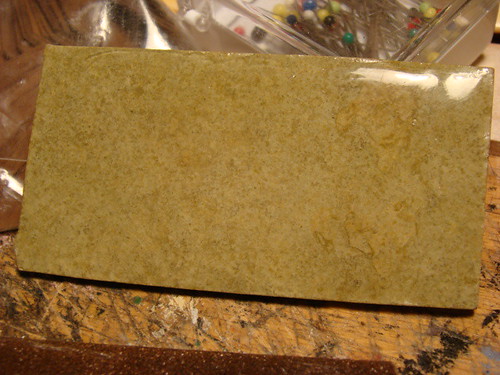



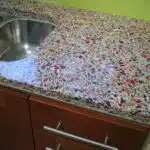



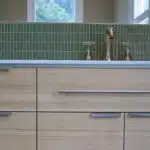
![Calculating How Much Stone Dust You Need 10 [Blog Post]Stone Dust © Oxfam Australia](https://green-life.blog/wp-content/uploads/2023/05/GdZVzgTqPhjq-150x150.jpg.webp)



